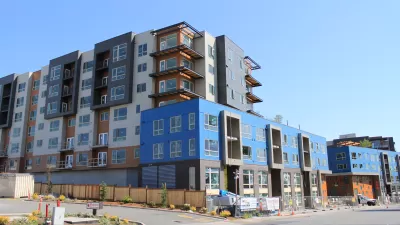Big investments in residential building in New York City indicate the strength of the city's economy, according to an article in Crain's New York Business.
"Spurred by the boom in residential building, total construction spending in the city will reach a record $39 billion this year and increase another 5% in the next two years," reports Greg David.
Citing projections from the New York Building Congress, David notes that the private sector is picking up the slack from the public sector: "Government spending, which accounted for more than half of all construction outlays in the previous two decades, will account for only a third this year"—though the article predates the recent approval of the MTA capital plan.
The article also goes into more detail about the relationship of the expiration of the 421-a tax break, which Josh Barbanel detailed in a separate article from July. "With [421-a] continuation beyond 2015 now dependent on a deal between builders and the construction unions over wages on 421-a projects, there could be another flurry at end of the year," adds David.
FULL STORY: City construction soars as residential outpaces government spending

Planetizen Federal Action Tracker
A weekly monitor of how Trump’s orders and actions are impacting planners and planning in America.

Maui's Vacation Rental Debate Turns Ugly
Verbal attacks, misinformation campaigns and fistfights plague a high-stakes debate to convert thousands of vacation rentals into long-term housing.

San Francisco Suspends Traffic Calming Amidst Record Deaths
Citing “a challenging fiscal landscape,” the city will cease the program on the heels of 42 traffic deaths, including 24 pedestrians.

Defunct Pittsburgh Power Plant to Become Residential Tower
A decommissioned steam heat plant will be redeveloped into almost 100 affordable housing units.

Trump Prompts Restructuring of Transportation Research Board in “Unprecedented Overreach”
The TRB has eliminated more than half of its committees including those focused on climate, equity, and cities.

Amtrak Rolls Out New Orleans to Alabama “Mardi Gras” Train
The new service will operate morning and evening departures between Mobile and New Orleans.
Urban Design for Planners 1: Software Tools
This six-course series explores essential urban design concepts using open source software and equips planners with the tools they need to participate fully in the urban design process.
Planning for Universal Design
Learn the tools for implementing Universal Design in planning regulations.
Heyer Gruel & Associates PA
JM Goldson LLC
Custer County Colorado
City of Camden Redevelopment Agency
City of Astoria
Transportation Research & Education Center (TREC) at Portland State University
Jefferson Parish Government
Camden Redevelopment Agency
City of Claremont




























